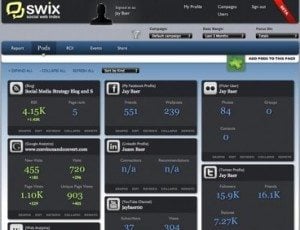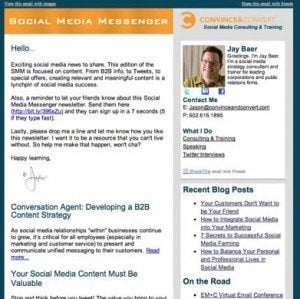أنشئ حسابًا أو سجّل الدخول للانضمام إلى مجتمعك المهني.

I found something on the net, which may be useful. I am just quoting it here:::::
I use Buffer for scheduling and sharing my posts to Twitter, Facebook, Linkedin and Google + throughout the day, at the optimal times. It;s a super easy to use tool, and includes detailed analytics so you know what’s working where, why and when. The best part is their browser extension that let’s you “buffer” and share any web page, photo, even a text excerpt. You’ll also see that you can use Buffer to share content right on this blog (see the Buffer icon up next to Twitter and Facebook).
Tweetdeck I use Tweetdeck for serious twitter sessions. I find it to be especially valuable and hassle-free for updating Twitter, Facebook, and LInkedin simultaneously. I do this only occasionally, however, as my friends/followers on each site don’t have much overlap.
Tweetie This extremely intuitive Mac-only app is my hour-to-hour choice for Twitter. It doesn’t have the advanced functionality of Tweetdeck (such as cross-posting to Facebook), but it’s so easy-to-use that it’s my favorite Twitter app. It takes up a lot less screen real estate that Tweetdeck, and I always use Tweetie when conducting my live, Twitter20 interviews.
Objective Marketer This power-user Twitter app is the preferred vehicle for Guy Kawasaki. I use Objective Marketer for all of my in-advance Tweets, and when I want to engage in some headline and/or time of day testing. Lifetime statistics, cross-posting, multiple accounts, etc. If you’re serious about Twitter, this is a great app. It’s a good choice for agencies, too. (Disclosure: Objective Marketer gave me a free account)
Note: There are thousands of Twitter apps (literally). If you really want to roll around in the possibilities, spend some time over at Laura Fitton’s (@pistachio) One Forty, the app store for Twitter.
 I don’t use a lot of apps for Facebook, preferring to play it pretty close to the vest there – for now. (I’m working on a Fan Page that will be launching next month). Meanwhile, however, I do very much like Facebook Lite, which strips down a lot of the shiny distractions, and gives you a threaded News Feed, birthdays, and events – and that’s about it. I think Facebook Lite makes Facebook engagement easier – maybe you will too?
I don’t use a lot of apps for Facebook, preferring to play it pretty close to the vest there – for now. (I’m working on a Fan Page that will be launching next month). Meanwhile, however, I do very much like Facebook Lite, which strips down a lot of the shiny distractions, and gives you a threaded News Feed, birthdays, and events – and that’s about it. I think Facebook Lite makes Facebook engagement easier – maybe you will too?
(The blog is on WordPress)Disqus This is what I use to manage comments here at Convince & Convert. There are some elements of Disqus I don’t like, especially that it doesn’t always play nice with other plug-ins, but it does make commenting easier and faster for most of you who already have a Disqus account. I’ve seen my average number of comments increase since I moved to Disqus.
ChatCatcher This is a nice little tool that finds Tweets about your blog posts, and automatically adds them as comments. This is one of the plug-ins that doesn’t sync well with Disqus, so it’s not working as well as it used to, pre-Disqus. Also, some bloggers (including Ari Herzog and Valeria Maltoni) don’t favor including tweets as comments, since they are not true “comments.” But, if you want to organize and harvest the tweets about your posts, this is the plug-in you want.
Topsy One part virality tool, one part tracking mechanism, one part social listening post, Topsy is becoming one of new favorites. I’ve moved from Tweetmeme to Topsy on my embedded tweeting, due to improved metrics, and Topsy’s competitive intelligence capabilities are impressive. Find a tweet your competitor sent, and see how many times it was retweeted, by whom, which among them are influencers, etc. It works like bit.ly, but incorporates all URL shorteners into the data mix.
Sexy Bookmarks Plug-in My friend Michael Stelzner from Social Media Examiner (where I guest post monthly), turned me on to this excellent plug-in that improves upon the social sharing user interface. See an example at the bottom of this post (the little squares that animate when you put your cursor over them).
What Would Seth Godin Do Technically, I don’t use this plug-in any longer, as my apres-post appeals are now hard-coded, but this is an excellent little nugget that not enough people utilize. Use WWSGD to include a little message before or after each of your posts, asking readers to subscribe to your RSS feed (or buy you a drink). The genius of this plug-in (and the reason it’s named after Seth Godin) is that you can set one message for first-time visitors, and a second message for repeat visitors. Smart.
All In One SEO Pack Like many bloggers, I utilize the excellent All in One SEO Pack plug-in to optimize posts for search engine rankings. This nifty piece of software allows you to specify page title, description, and keywords for each post. A must.
Apture Although I don’t use it all the time, I find myself turning to it with increased frequency. Apture is a handy plug-in that finds photos, videos, links and related content that you can embed or link to within your posts with a single click. Extremely handy for locating and adding links to specific Web pages (see link to Seth Godin above).
Flickr Creative Commons Search This is my go-to source for photos for the blog and presentations. Using Flickr’s advanced search, you can browse photos that are specifically made available under a Creative Commons license, allowing you to use them with attribution in blog posts, etc.
Shutterstock When I want a slightly higher grade of photo, or more precise searching, I utilize Shutterstock. This robust source for inexpensive stock photography is my secret lair of images for my presentations and workshops. Pricing is very reasonable, as you can download and use60 images a year for just $229.
Skitch I’m no Photoshop wizard. In fact, I’m basically illiterate at photo manipulation. That’s why I use Skitch, an incredibly intuitive image grabber and cropper (for Mac) that has the very attractive added benefit of being free.
Google Analytics No surprise, this is my primary statistical source for Convince & Convert. Despite being free, Google keeps adding functionality to Google Analytics. I have a few goals set up, including visits to my speaking page; visits to my consulting page; time spent on the site, etc.
bit.ly The dominant URL shortener is also the best – in my opinion – at tracking and analytics. I implement bit.ly URLs whenever possible, and make liberal use of their “+” feature. Add “+” at the end of any bit.ly URL to see how many times it’s been clicked on, and by whom. Try it yourself. Excellent for down-and-dirty competitive analysis.
 Swix This is a slick new social media dashboard program that I’ve been trying. I’m planning to write a full post about it soon, but the real genius of Swix is that it allows you to easily create a unified scoreboard of all your key social media metrics like blog traffic, subscribers, Facebook fans, Twitter followers, YouTube subscribers, and much more.
Swix This is a slick new social media dashboard program that I’ve been trying. I’m planning to write a full post about it soon, but the real genius of Swix is that it allows you to easily create a unified scoreboard of all your key social media metrics like blog traffic, subscribers, Facebook fans, Twitter followers, YouTube subscribers, and much more.
Authority Labs By far my favorite tool for tracking search engine positioning, Authority Labs shows you at a glance whether you’re #4 or #40 in Google, Bing and Yahoo! for whatever search terms are important to you and your business. Owned by my friend Chase Granberry in Arizona, Authority Labs gave me a free account.
Cameras For still photos, I typically use my iPhone3GS or Panasonic Lumix TZ5. I use the Panasonic a ton with my family, as I find it to have the best combination of zoom and wide angle capabilities.
For videos, I recently got a Kodak ZI-8 which I prefer to my old Flip because it has an external microphone jack. This is an important advantage, as I bought a $30 lavalier microphone and can now grab good audio even at crowded conferences, etc. The one downside is Kodak’s built-in video software pales in comparison to Flip’s, forcing me to use iMovie on the Mac, which I can barely tolerate.
TubeMogul For video upload and syndication, I often use TubeMogul, which allows you to upload a single video clip to dozens of video sites – not just YouTube. The real advantage of TubeMogul, however, is that you can get comparative statistics. For example, how many views did your video get on each site, and how long on average did viewers watch your clip on each site? It’s a great tool for moving beyond video upload to strategic video optimization.
SlideShare I upload most of my presentations to SlideShare, and find it to be a valuable resource for growing an audience. My presenation “7 Ways to Build Stunning Business and Personal Brands in Social Media” was originally given in person to35 people. Since I uploaded it to Slideshare, it’s been viewed12,360 times. That’s the magnifying power of Slideshare – which also now allows you to upload audio tracks to accompany your presentations.
Twazzup For quick Twitter searches, I prefer Twazzup, due to its straightforward interface, and overall speed.
SocialMention For more comprehensive social media searching, I use SocialMention, which indexes blogs, tweets, message board posts, and a lot more. See my post on How to Create a Share of Voice Report for a free worksheet that uses SocialMention.
Google Alerts Like most marketing professionals, I have several Google Alerts set up for my name, my company name, and topics of interest to me. This is invaluable for finding bloggers that have linked to my posts, so I can go to their blog and thank you in the comments – a practice I highly recommend.
Radian6 For advanced social media listening, I often recommend my friends at Radian6, who have – in my opinion – the most robust feature set and product development roadmap of all the widely available social listening platforms.
 ExactTarget To produce, send, and track my free, twice-monthly email newsletter “The Social Media Messenger” (sign up here if you don’t receive it yet), I use my friends at ExactTarget. Given the simplicity of my newsletter, sending it via ExactTarget is like flying on a jet plane to go get a quart of milk, but it’s nice to know that massively advanced functionality is available if I need it. (disclosure: ExactTarget is a client, and I have worked with them for more than six years)
ExactTarget To produce, send, and track my free, twice-monthly email newsletter “The Social Media Messenger” (sign up here if you don’t receive it yet), I use my friends at ExactTarget. Given the simplicity of my newsletter, sending it via ExactTarget is like flying on a jet plane to go get a quart of milk, but it’s nice to know that massively advanced functionality is available if I need it. (disclosure: ExactTarget is a client, and I have worked with them for more than six years)
Feedburner To power my RSS feed and to send daily emails whenever I write a new post, I use Google’s Feedburner service. It’s not perfect, but it’s free and easy to implement. Note that nearly40% of all subscribers to this blog are via email, not RSS. Are you pushing email subscriptions to your blog hard enough?
Flowtown As mentioned in my post last week, this is my favorite new tool. Flowtown allows you to take email addresses (like the people subscribed to my newsletter) and determine in which social networks they are active. This is especially handy when you need to segment your audience. For example, when I’m ready to invite people to my new Facebook Fan Page, I can use Flowtown to determine which of you are active on Facebook, and send an email only to that group. Nifty.
NutshellMail See tomorrow’s post for a deeper look at this tool, but NutshellMail brings your social media activity to you via email, instead of you having to surf around and use tools to see what’s happening. Extremely handy while traveling, I also highly recommend Nutshell for casual social media users.
Just about anyone that builds a social media audience partially does so because they create a lot of content, and are responsive. Mobile access to the social Web is a virtual requirement to do it well.
Tweetie2 I’ve used at least six iPhone apps for Twitter, but for now I prefer Tweetie2, which makes the best use of the iPhone’s swipe features. You can do more in less time with Tweetie2 on the iPhone, and it’s super fast and bug-free.
Facebook The original Facebook app on iPhone was just okay, but it’s been massively improved, to the point that Facebook access via mobile might actually be easier than on a computer. (100 million people use Facebook mobile every month, by the way). The single best aspect is photo and video upload and captioning, which is integrated so tightly with iPhone that it truly is better than laptop or desktop uploading.
Linkedin Similarly, the Linkedin iPhone app has made major strides, and I find myself rarely using Linkedin via a computer any longer.
 Gowalla For presence-based status updates, I use Gowalla. I’ve tried Foursquare, too. But for me, more of my three-dimensional friends who are close enough geographically that I care what restaurant they are at are using Gowalla. I push Gowalla updates to my Facebook friends, but not to Twitter where I figure my geographic status is less illuminating.
Gowalla For presence-based status updates, I use Gowalla. I’ve tried Foursquare, too. But for me, more of my three-dimensional friends who are close enough geographically that I care what restaurant they are at are using Gowalla. I push Gowalla updates to my Facebook friends, but not to Twitter where I figure my geographic status is less illuminating.
WordPress The WordPress iPhone app is slick. You can write, edit, update posts; add photos; and approve comments (although not with Disqus). Great little app for on-the-fly blog management.
Analytics For basic stats tracking, this app is better and faster than Google Analytics on the computer. It also includes a handy “today” reports that shows you what’s happened on your blog since last night – a report that Google Analytics still doesn’t offer.
Print n Share For true device-agnostic types, this is a great app that allows you to print from your iPhone to any printer. You probably won’t use it every day, but when you need to print a boarding pass or slide handouts from your iPhone, you’ll be delighted you have this one.
Zenbe This is a no-frills to-do list app that syncs between the Web and iPhone. Indispensable for me, and I’m constantly checking it to see what projects I have due, what posts I need to write, etc.
Bonus: DirecTV If you have an iPhone and DirecTV, this is uber-handy. If you forget to tape a show, or just want to tape some super crazy show remotely to freak out your spouse when he/she looks at your playlist, this is a must-have.



